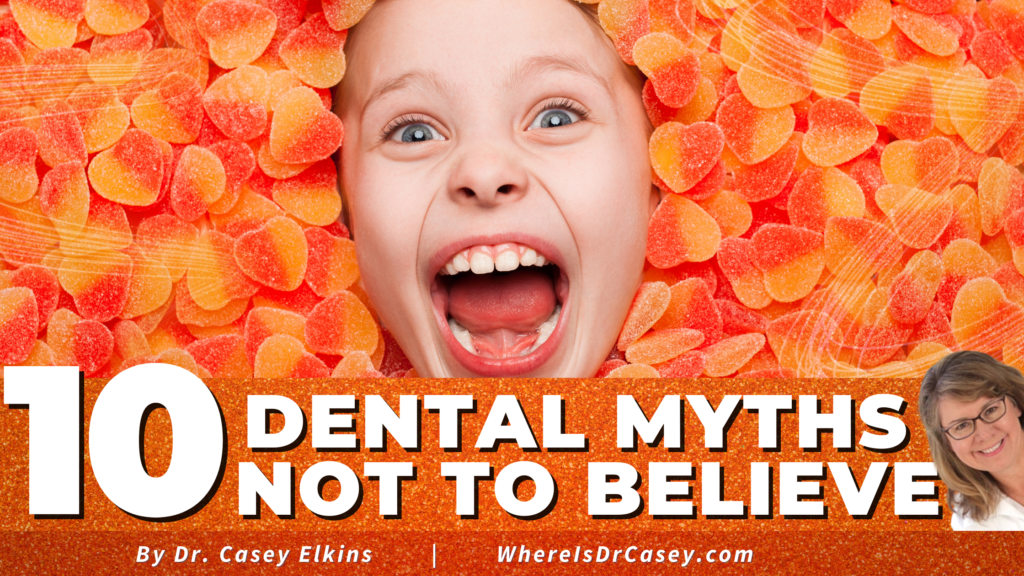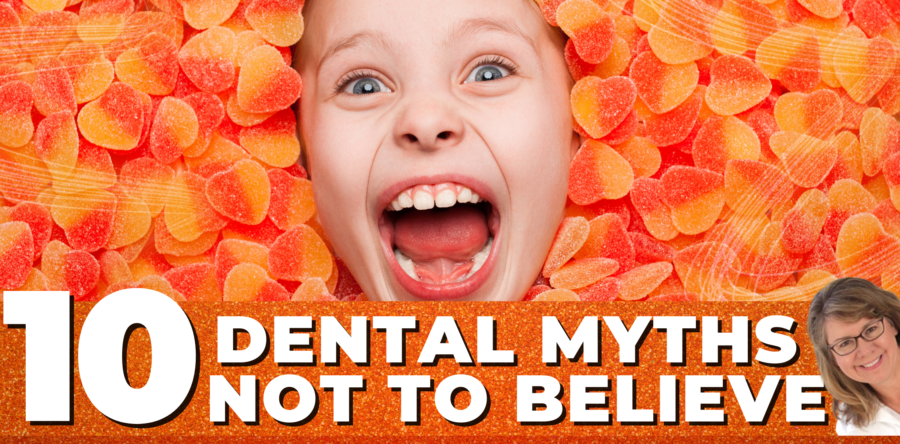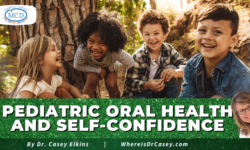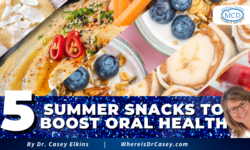
As a mother and a dentist, Dr. Casey has heard countless Oral Health myths. She also believes it’s important to share that knowledge with other parents too!
These myths relate to everything from daily hygiene routines to long-term oral health remedies. The more we know as parents, the better dental decisions we can make for our children.

Some people have created a habit of brushing their teeth immediately after consuming snacks or a meal. The American Dental Association (ADA) recommends waiting at least 30 minutes after eating before brushing your teeth or your child’s teeth.
This is because our saliva naturally cleans our teeth to an extent and allowing it the chance to do its job makes your job as a parent easier. This is especially important to remember after your child consumes acidic foods and drinks, as the acid levels can also cause damage to your child’s teeth.
There are usually other activities involved in the morning or nighttime routines that can be done in between munching on food and oral care.

This myth is one that goes back to some of our own childhoods. The truth is that there is no adequate alternative to brushing our teeth, the same goes for our children.
Mouthwash and mouth rinses are mainly designed to freshen our breath. Some brands do offer products that contain fluoride in them in order to assist in the prevention of cavities and tooth decay.
The main reason that there are no adequate alternatives to brushing is due to the fact that brushing’s efficiency in removing the sticky plaque that builds up on our teeth. This plaque is what will eventually lead to cavities and other oral health problems if not removed regularly.

Some people deal with their oral health reactively, only seeing their dentist for checkups or cleaning if they see or feel something “wrong” with their teeth. This strategy often costs families more, as Dr. Casey and dental hygienists are trained to look for problems before they occur.
Choosing a proactive approach to your family’s oral care by keeping regular, ADA-recommended 6-month dental checkups and engaging in good oral hygiene routines. These bi-yearly appointments assist Dr. Casey and her team in offering your children the best care possible.
You are always welcome to contact our office with any questions concerning oral care or scheduling appointments. We can help you figure out when is the best time to come in for your child's check-up.

This is a myth through and through! While electric toothbrushes are a little more effective at cleaning our teeth, they do not replace flossing. In fact, if you just brush with a toothbrush, electric or manual, you miss cleaning 35% of each tooth’s surface.
The only efficient way to clean between your teeth and under your gums is by using dental floss. Nowadays, there are different kinds of floss, including floss picks that are specially designed for children and teens. These are great products for assisting your children in the journey to becoming more independent.
Just as we brush for healthy teeth, we floss for healthy gums! So don’t forget to floss too!

Many of the fruit juices and diet drinks marketed to the general public as healthy are not as healthy as you’ve been led to believe. There are many fruit juices that can be detrimental to our oral health.
These drinks contain natural sugars and acids that are known for breaking down enamel, as well as causing cavities and gum disease. Diet drinks often contain additional acidic ingredients that can wear down your child’s tooth enamel.
The healthiest choice is always water. However, we know it’s a pretty “boring” option when considering flavor. However, water also plays an important role in washing away food debris and cleansing our mouths after we eat or drink. In fact, after consuming acidic drinks, sugary drinks, or sodas you should chase it with some fresh water.

While it is important to have your child spit out any foam and access toothpaste, you should not rinse their mouth out with water after brushing.
The reason why is that rinsing after with water washes away the layer of fluoride meant to protect your child’s teeth. We recommend waiting at least 5-10 minutes before drinking water after brushing. This allows time for the fluoride to settle in.
You can rinse after brushing with mouthwash containing fluoride. This will ensure you don’t wipe away the protective Flouride layer as well.

While sugar is a factor in the development of cavities and tooth decay, it actually is not sugar that causes the problem. Instead, it’s the oral bacteria that eats the sugar.
Certain sticky foods, including starches, attract these bacteria to thrive on our teeth. They are known to produce a compound that promotes tooth decay and can eventually lead to cavities.
Good oral hygiene and regular dental checkups are an easy way to prevent plaque buildup over time.

Bleeding gums are never normal for patients of any age. When our gums bleed during brushing or flossing, it’s due to the inflammation of the gums. This is oftentimes due to excessive plaque buildup under the gums.
Bleeding gums is very commonly a symptom of the onset of Gingivitis, gum disease, and also periodontal disease. If you notice your child’s gums bleeding, feel free to reach out we would love to help.
If left untreated, periodontal disease can lead to other health complications throughout the body via the Oral Systemic Connection. This is why we believe in the importance of good, lifelong oral health.

Believe it or not, brushing harder is counterproductive. The more aggressively your child brushes their teeth, the more trauma your tooth enamel and gums endure.
Brushing too hard can lead to issues such as gum recession. This is why it is so important to use age-appropriate toothbrushes for children, as well as engage in active supervision over them.

Chewing gum is not a replacement for brushing or flossing, even though some can aid in promoting cleaner teeth between brushing.
For children old enough to chew gum responsibly, Dr. Casey recommends sugar-free gum, which can be a good alternative to sugar-loaded alternatives, such as candy. However, we still recommend that chewing gum, even sugar-free, does not become a habit, as gum can cause other issues in the future with braces and dental crowns.
Good oral health is an important part of maintaining good overall health. This is why Dr. Casey believes it is vital to teaching parents how to best care for their children’s oral health. If you are interested in learning more dental myths or tips, please feel free to check out Dr. Casey’s dental articles or contact us to schedule your child’s next appointment today!







4 Responses